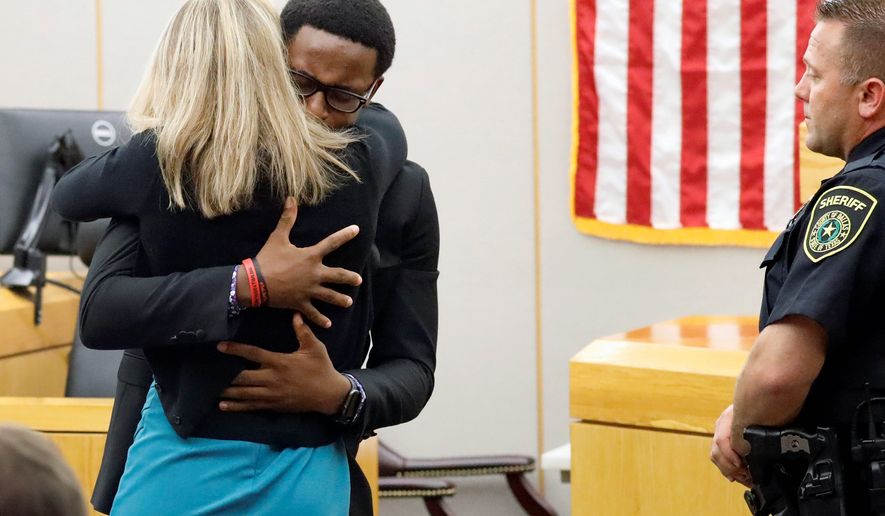OPINION:
On Oct. 2, Brandt Jean, the younger brother of Botham Jean, who was shot and killed by the off-duty Dallas police officer, Amber Guyger, shook the political landscape as well as our cultural assumptions of justice and jurisprudence.
In one of the most moving moments seen in an American courtroom in recent memory, this young man told the woman who was just convicted of murdering his older brother that he forgave her.
“I wasn’t ever going to say this in front of my family or anyone [else], said Brandt Jean, “but I don’t even want you to go to jail. I want the best for you because I know that’s exactly what Botham would want. And the best would be to give your life to Christ. I’m not going to say anything else. I think giving your life to Christ would be the best thing that Botham would want you to do. Again, I love you as a person and I don’t wish anything bad on you.”
Echoing his younger son’s remarks, Brandt’s father responded: “I felt the same way. I wish I could’ve extended the same courtesy. That is what Christ would want us to do … If you will not forgive, neither will your father [in heaven] forgive you. I don’t want to see her rot in hell. I don’t want to see her rot in prison. I hope this will help her to change …”
Presiding Judge Tammy Kemp responded by stepping off the bench and handing Guyger her personal Bible. She said: “You haven’t done so much that you can’t be forgiven. You did something bad in one moment of time. What you do now matters.” Summarizing, she then whispered in Guyger’s ear, “Ma’am, it’s not because I am good. It’s because I believe in Christ. None of us are worthy.”
This is the heart of the Gospel.
None of us are worthy. None of us are good. All of us are sinners, and I am chief among them. We all are broken, and if we think we are justified, we stand condemned already.
But in spite of all this, Jesus has atoned for us. In fact, he gave his very life for us: “But God commendeth his love toward us, in that while we were yet sinners, Christ died for us.”
The good news of the Gospel is that we can rise above resentment and revenge and become new creations in Christ. We don’t have to let others control us. We don’t have to be enslaved by perpetual victimization. We do not have to be held in bondage by the sins of others or the sins we find in ourselves.
We can forgive. We can be forgiven. We can be saved!
Saved from anger.
Saved from vengeance.
Saved from self-righteousness.
Saved from self.
Jesus made it clear that we should all pray, “forgive us our trespasses as we forgive those who trespass against us.” He says further, “For if you forgive men their trespasses, your Heavenly father also will forgive you; but if you do not forgive men their trespasses, neither will your Father forgive your trespasses.” Finally, Christ, models this by praying, even at the point of torturous death, “Father forgive them, for they know not what they do.”
Jesus could not be more clear. We need to be forgiven, and we need to forgive. Only forgiveness breaks the cycle of sin.
Martin Luther said, “For still our ancient foe, doth seek to work us woe; His craft and power are great, and armed with cruel hate, on earth is not his equal.”
John Newton cried, “There are two things I know: I am a great sinner, and Jesus is a great savior … Amazing Grace, how sweet the sound that saved a wretch like me.”
The cycle of “cruel hate” is only broken by grace; God’s toward you, and yours toward others. And grace is only made real through the act of forgiveness.
Endnote: Antithetical to this beautiful testimony of Brandt Jean, there was the ugly gunge of anger and resentment waiting on the steps just outside Wednesday’s courtroom. Chants of “No justice, no peace” rang out. “How many of us does it take to get justice?” One pastor even shouted, “It’s amazing how quickly injustice can be seized from the hands of justice. This is a travesty.”
But Brandt Jean clearly understands something this pastor and his protesters do not. The story of his brother is not one of recompense or payback. Botham’s story is not about demanding justice. It’s about granting forgiveness. Or, as Brandt so beautifully said, it’s about “giving your life to Christ [because that] would be the best thing that Botham would want you to do.”
Judge Kemp offered her closure to this story by saying, “Thank you [Brandt] for the way you modeled Christ.” But, if you listen very carefully, you might actually hear Jesus extending his perfect summary: “Well done, thou good and faithful servant. Well done.”
• Everett Piper, former president of Oklahoma Wesleyan University, is a columnist for The Washington Times and author of “Not A Day Care: The Devastating Consequences of Abandoning Truth” (Regnery 2017).




Please read our comment policy before commenting.